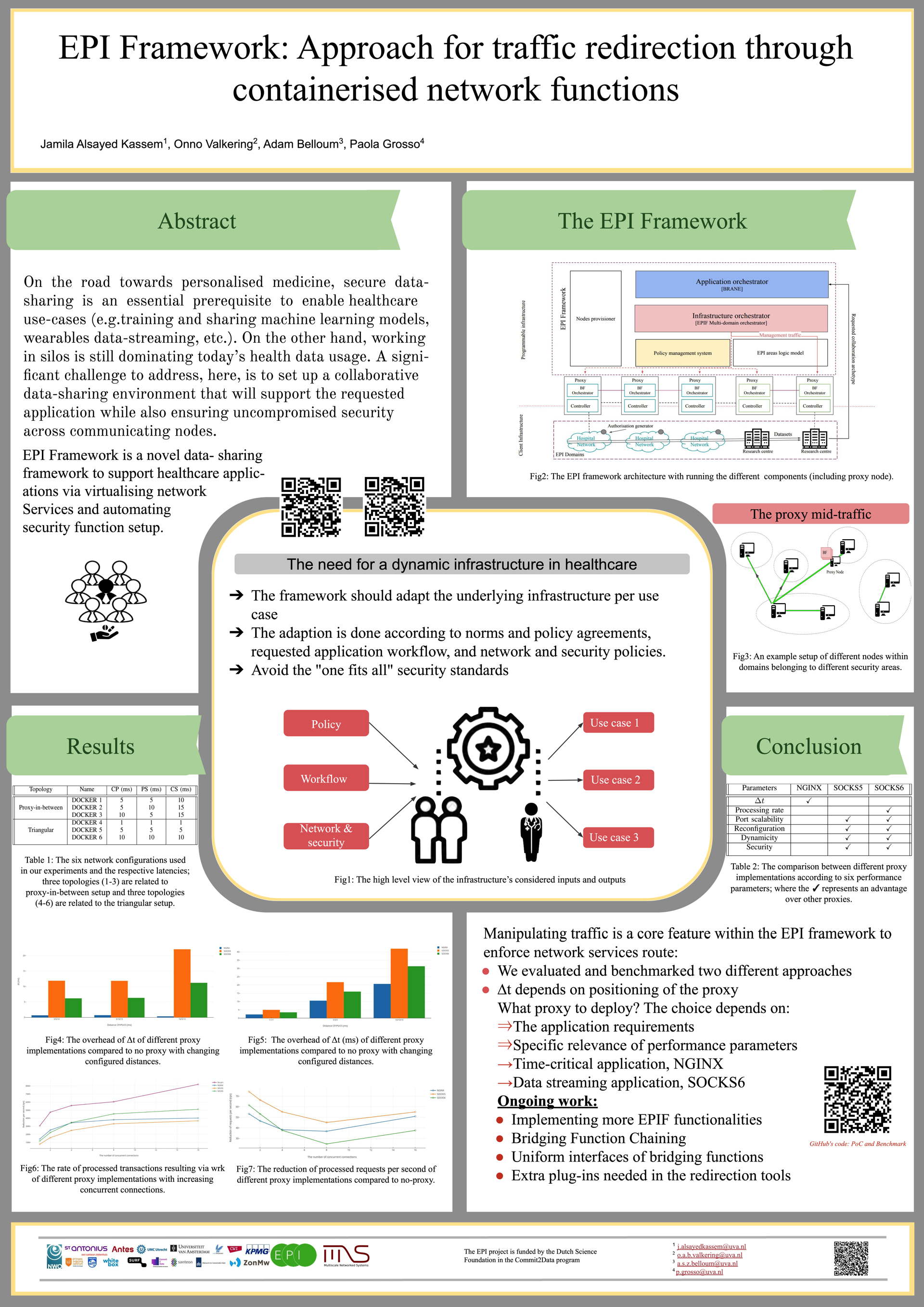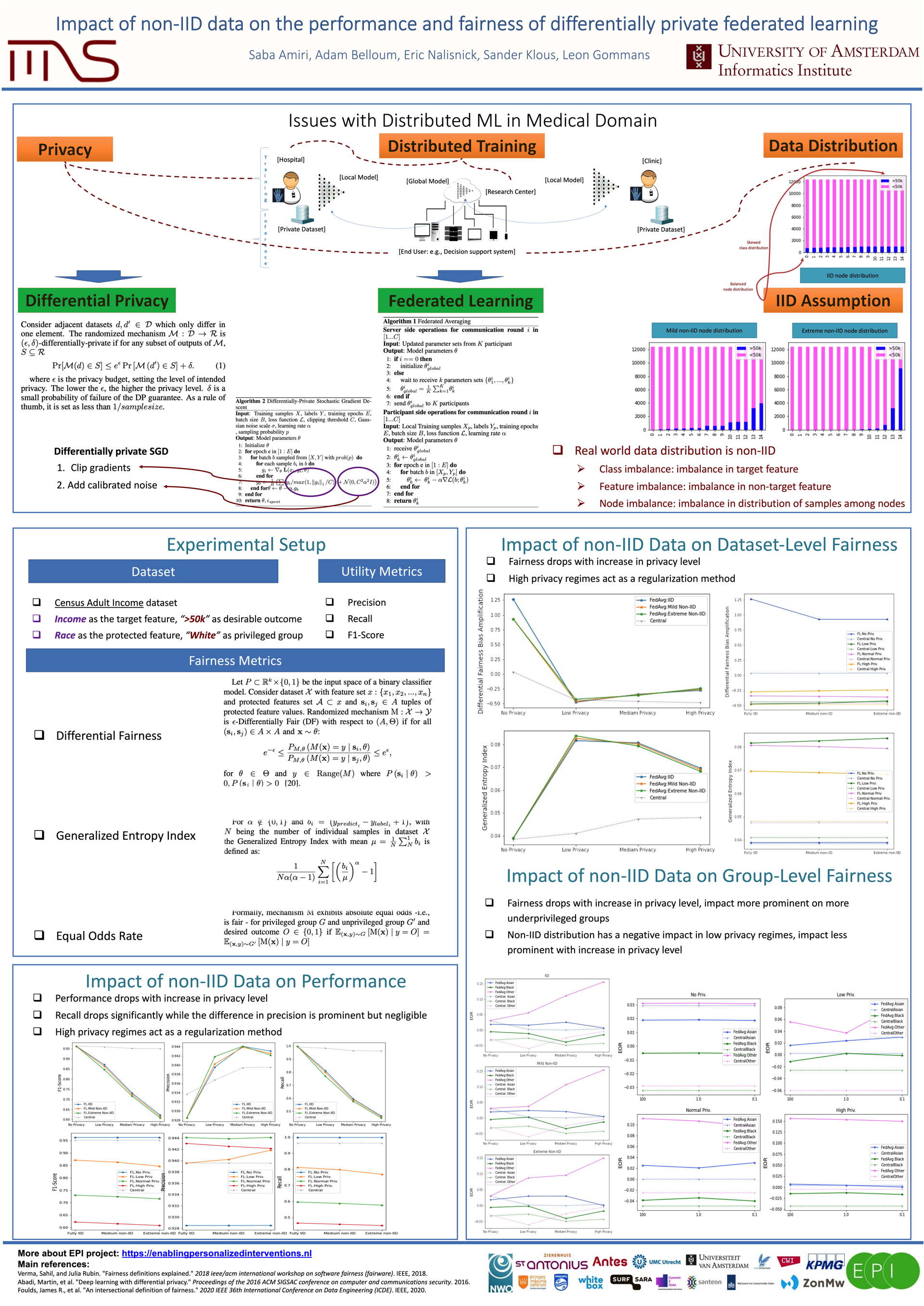 |
April 7, 2022: Enabling Personalized Interventions (EPI)
Consortium Meeting and contributions at ICT.Open.
|
  |
|
Consortium meeting:
|
| When |
Thursday, April 7th 2022
|
| Where |
@ ICT.OPEN in the Rai, Amsterdam
|
Abstract
|
Consortium and dissemination meeting
|
| Agenda |
| 11:30 |
Start Quarterly Consortium Meeting
|
_
|
|
|
|
Eline van Dulm
|
Welcome, overview of EPI
|
|
slides |
| 11:40 |
Presentations PhD students |
|
|
|
_
|
Rosanne Turner
|
RQ1-2: Real-time evidence collection in data streams
|
|
slides
|
|
|
Saba Amiri |
RQ4: Private Federated Machine Learning The EPI Project. |
|
slides |
|
|
Milen Girma Kebede
|
RQ5: Automating regulatory constraints and data governance in healthcare
|
|
slides |
|
|
Jamila Alsayed Kassem
|
RQ6: The EPI Framework: A dynamic infrastructure to support healthcare use cases. |
|
slides |
|
|
Tim Muller
|
Brane status update
|
|
slides |
|
|
Corinne Allaart |
RQ3: Vertically partitioned machine learning for prediction of cerebrovascular accident (CVA) rehabilitation. |
|
slides |
| 12:40 |
EPI Proof Of Concept |
|
|
|
|
Marc van Meel |
EPI PoC – collaboration UMCU & St. Antonius |
|
|
| 12:55 |
Any other business |
|
|
| 13:00 |
Closure |
|
|
|
|
|
Presentations presented at ICT.Open
|
Abstract: Towards a policy enforcement infrastructure using eFLINT (Slides) by Lu-Chi Liu.
Organizations are required to be compliant to national and international
privacy regulations to protect data subject's personal data. Therefore,
we need authorisation systems that can capture and enforce privacy
regulations. This work focuses on the design and implementation of an
authorisation system that can enforce conditions, authorisations and
obligations from legal norms. In previous work, we employ eFLINT, a
domain specific language, to capture policies extracted from a
regulatory document that governs members of the SIOPE DIPG/DMG Network, a
healthcare use-case. The language allows for the reuse of
specifications which is shown by reusing the GDPR and DIPG regulatory
document interchangeably. Additionally, we generate system level eFLINT
policies, such as read and write policies, from social policies.
We are currently working on a prototype for the DIPG Registry. The
prototype is designed using two approaches, either by implementing the
eFLINT reasoner as a Policy Administration Point(PAP) or as a Policy
Decision Point(PDP). In the first approach, eFLINT can be used to create
policies and generate enforceable XACML policies. XACML has several
limitations when it comes to specifying rules from legal norms. Using
eFLINT as a PAP can mitigate these issues as an extension to the XACML
architecture. In the second approach, eFLINT reasoner can be used as
both the PAP and PDP. When used as PDP, the Policy Enforcement Point
(PEP) signals every access request or system event to the eFLINT
reasoner. The eFLINT reasoner evaluates requests or events against
deployed eFLINT rules and makes access decisions.
|
|
Posters presented at ICT.Open
EPI Framework: Approach for traffic redirection through containerised network functions
Jamila Alsayed Kassem
On the road towards personalised medicine, secure
data-sharing is an essential prerequisite to enable healthcare use-cases
(e.g. training and sharing machine learning models, wearables
data-streaming, etc.). On the other hand, working in silos is still
dominating today’s health data usage. A significant challenge to address
here, is to set up a collaborative data-sharing environment that will
support the requested application while also ensur- ing uncompromised
security across communicating nodes. We need a framework that can adapt
the underlying infrastructure taking into account norms and policy
agreements, requested application workflow, and network and security
policies. The framework should process and map those requirements into
setup actions. On a low packet level, the framework should be able to
enforce the setup route via intercepting and redirecting traffic.
extended abstract here
|

|
|
|
Impact of non-lID data on the performance and fairness of deferentially private federated learning.
Saba Amiri
Federated Learning enables distributed data holders to train a shared
machine learning model on their collective data. It provides some
measure of privacy by negating the need for the participants to share
their private data, but still has been shown in the literature to be
vulnerable to adversarial attacks. Differential Privacy has been shown
to provide rigorous guarantees and sufficient protection against
different kinds of adversarial attacks and has been widely employed in
recent years to perform privacy preserving machine learning. One common
trait in many of recent methods on federated learning and federated
differentially private learning is the assumption of IID data, which in
real world scenarios most certainly does not hold true. In this work, we
perform comprehensive empirical investigation on the effect of non-IID
data on federated, differentially private, deep learning. We show the
non IID data to have a negative impact on both performance and fairness
of the trained model and discuss the trade off between privacy, utility
and fairness. Our results highlight the limits of common federated
learning algorithms in a differentially private setting to provide
robust, reliable results across underrepresented groups.
|

|
|
|




